Strategies to prevent and treat pneumonia must be strengthened to address the large global burden
Cape Town, Glenview, Lausanne, Montevideo, New York, Paris, Tokyo (November, 12, 2016) In support of World Pneumonia Day, 12 November, the Forum of International Respiratory Societies (FIRS) calls for global efforts to strengthen effective strategies to protect against, prevent and treat pneumonia.




